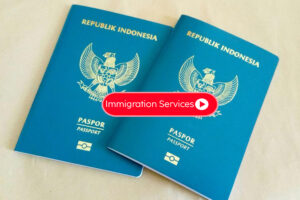Global Talent Visa: The decision of thousands of Indonesian citizens to change their nationality and become Singaporean citizens has drawn attention. What makes this phenomenon particularly interesting is that these individuals are in their productive years, ranging from 25 to 35 years old. The Directorate General of Immigration of the Ministry of Law and Human Rights has reported that a total of 3,912 Indonesian citizens have opted for Singaporean citizenship. To address this growing trend, immigration authorities have introduced the Global Talent Visa policy as a response to the increasing number of Indonesians changing their nationality.
The Directorate General of Immigration has documented these changes in citizenship status between the years 2019 and 2022. Director General of Immigration, Silmy Karim, emphasized the legality of changing one’s nationality as long as it is done through proper legal channels, especially if it is pursued for the purpose of achieving a better quality of life.
The forthcoming Government Regulation that will serve as the legal basis for the Golden Visa is currently in the final stages of being signed by the president and is expected to be issued in the near future.
Understanding the concept of the Golden Talent Visa
The Golden Talent Visa falls under the category of the Golden Visa, which is granted to foreign nationals who possess exceptional professional knowledge or skills in their respective fields, aiming to contribute to Indonesia’s economic growth and the development of its human resources.
This policy is designed to promote economic and technological advancements within the country through the participation of highly skilled foreign workers.
Requirements for obtaining the Golden Talent Visa
Acquiring the Golden Talent Visa is a process that requires meeting specific criteria and fulfilling certain requirements. The Immigration authorities have outlined these conditions for foreign nationals seeking to obtain the Global Talent Visa:
- Graduating from one of the top 100 universities worldwide with a Cumulative Grade Point Average (CGPA) of 3.5, supported by an official academic degree;
- Possessing a certificate of competence in a specific field that aligns with the country’s legal requirements, as determined by the Minister/Director General;
- Providing a letter of recommendation from the relevant ministry/agency that confirms the applicant’s skills and expertise.
Foreign nationals who satisfy these criteria and meet the necessary requirements will have the opportunity to be considered for the Global Talent Visa, subject to the recommendation of the Indonesian government.
Advantages and benefits of the Golden Talent Visa
Countries worldwide have been streamlining their immigration processes, and the implementation of the golden talent visa program has become a global trend. In light of the ease of cross-border migration and the various advantages offered by different countries, Indonesia has proactively pursued policies to attract high-quality foreign nationals.
Director General Silmy stated, “Indonesia requires productive and potential human resources, not only from within its borders but also from abroad. This is one of the driving factors behind the initiation of the Global Talent Visa.”
By issuing this visa, Indonesia aims to attract highly skilled foreign tourists, allowing them to contribute their expertise and knowledge, thereby elevating the standards and capabilities within the country.
Potential drawbacks and concerns associated with the Golden Talent Visa
While the Golden Talent Visa holds the potential for positive effects on the nation, there are also concerns regarding its potential negative implications. Lusia Novita Sari from the Secretariat of the Cabinet of the Republic of Indonesia has pointed out the possible risks associated with this visa policy.
She suggests that the government’s decision to grant this type of visa could be interpreted as a form of selling citizenship. Additionally, the visa scheme may pose risks related to the misuse of residence and business permits, as well as an increase in cases of corruption, tax evasion, money laundering, and financing of terrorist groups.
Therefore, it is imperative for the government to conduct an extensive and meticulous evaluation of the policy, taking into account various factors and potential consequences. Striking a balance between attracting high-quality foreign talent and safeguarding the country’s interests requires careful consideration and adherence to legal principles.
As the government finalizes this policy, it is crucial to align it with existing laws and regulations, ensuring that it contributes to the country’s long-term growth and development while safeguarding its integrity and security.





 20% off today. Whatsapp us!
20% off today. Whatsapp us!